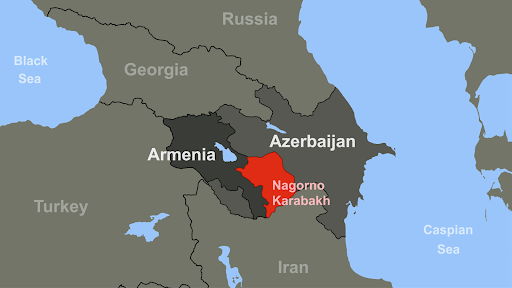Azerbaijan-Armenia border clashes
Why in news?
- Dozens of Armenian and Azerbaijani soldiers have reportedly been killed in renewed border clashes between Armenia and Azerbaijan, in the worst round of hostilities since 2020.
- After several hours of fighting, the Armenian government appealed to world leaders for help, saying that Azerbaijani forces were trying to advance into its territory.

Centuries-old conflict and its passage till now:
- Christian majority Armenia and Muslim majority Azerbaijan have been in a state of near conflict for centuries, initially over religion but more recently concerning territorial disputes.
- The current crisis draws its roots from the early 1920s when Russia under Joseph Stalin conquered large parts of the Caucasus.
- At the time, Stalin placed the Armenian dominated region of Nagorno-Karabakh into Azerbaijan. As the erstwhile USSR started to collapse in the late 1980s, nationalist forces on both sides started a battle for control over the disputed region. In 1991, ethnic Armenians in the region declared independence culminating in an all-out war three years later.
- By 1994, Armenia managed to drive large swaths of the Azerbaijani military out of Nagorno-Karabakh. The violence left tens and thousands dead and displaced hundreds of thousands.
- Later that year, a Russian imposed ceasefire took effect but failed to resolve the underlying dispute. Clashes have broken out sporadically since then, most notably in 2020.
- Although the enclave is still recognised internationally as Azerbaijani territory, it is dominated by ethnic Armenians and controlled by Armenian separatists who have declared it as the “Nagorno-Karabakh Autonomous Oblast”.
- While the Armenian government does not recognise the region as independent, it does support the region politically and militarily.
- In 2018, Armenia went through a so-called Velvet Revolution in which its president at the time was peacefully deposed, leading to hopes that the conflict could be peacefully resolved. Although Armenia’s new president Nikol Pashinyan, indicated that he was willing to settle the issue diplomatically, he later backtracked on his statements, arguing that Nagorno-Karabakh belonged to Armenia.
Reference:
Subscribe
Login
0 Comments
